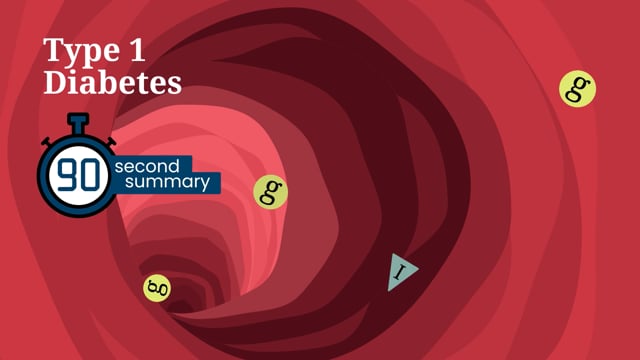How to Stay Healthy With Type 1 Diabetes
Kids who have type 1 diabetes should do 4 four things to stay healthy:
- Take insulin insulin (say: IN-suh-lin)
- Check blood sugar levels
- Eat a healthy diet
- Stay active
Doing these 4 things helps keep your blood sugar at a healthy level. Your diabetes treatment plan explains how to do it. Your doctor can tell you all about your plan.
-

90-Second Summary: Type 1 Diabetes
Learn the basics in 90 seconds.
Why Do Kids With Type 1 Diabetes Need to Take Insulin?
Kids with type 1 diabetes need to take insulin because their bodies can't make it. Most kids get insulin from shots, but some kids get it from an insulin pump.
Insulin helps glucose (sugar) get into the cells to give them energy. Glucose (say: GLOO-kose) comes from the foods we eat. Without insulin, glucose can’t get into the cells, and it builds up in the blood. If glucose stays in the blood, blood glucose levels can get too high and make kids sick.
Why Do Kids With Type 1 Diabetes Need to Check Blood Sugar Levels?
Kids need to check their blood sugar levels to know if those numbers are in or out of their healthy range. When blood sugar levels are in a healthy range, kids feel better. And kids are less likely to have problems later.
Your diabetes care team will tell you what your blood sugar levels should be and when you should test. Most kids with type 1 diabetes test about four times a day using a blood glucose meter.
Some kids use a continuous glucose monitor (CGM) instead of blood glucose meter. A CGM is a wearable device that measures blood sugar every few minutes, 24 hours a day. A CGM gives the care team a lot of information that can help keep blood sugars in a healthy range.
Why Do Kids With Type 1 Diabetes Need to Eat Healthy?
The foods you eat change your blood sugar levels. Eating healthy foods in the right amount at the right time can make a difference.
Some kids find it helpful to follow a diabetes meal plan. A meal plan recommends foods to eat and a schedule for meals and snacks. It also suggests portion sizes that are right for you.
Why Do Kids With Type 1 Diabetes Need to Stay Active?
Exercise and active play help keep blood sugar levels in a healthy range. This can prevent health problems now and later in life.
But blood sugar levels can change during exercise, so kids need to know how to handle it. Your diabetes care team can give you tips to follow for before, during, and after exercise. And they can tell you what to do if you don't feel right while you're playing.
